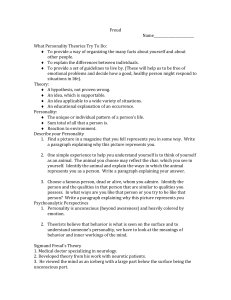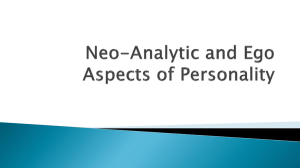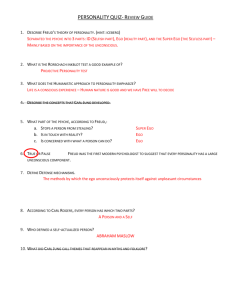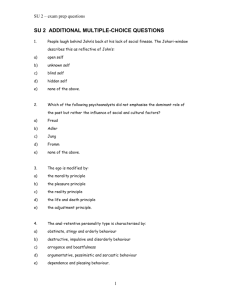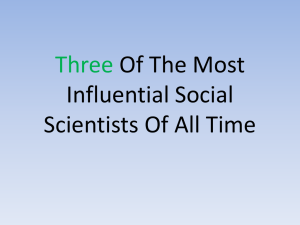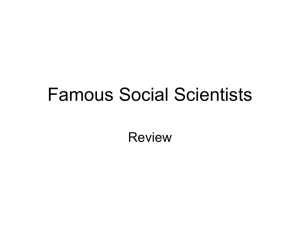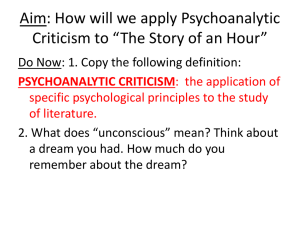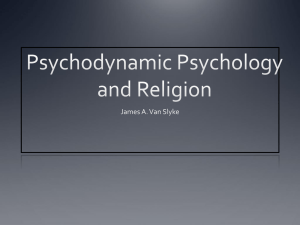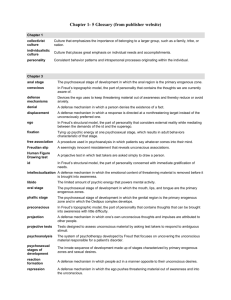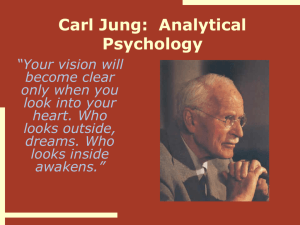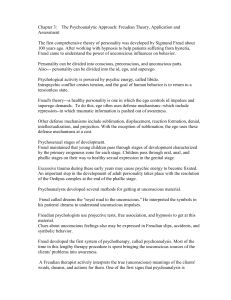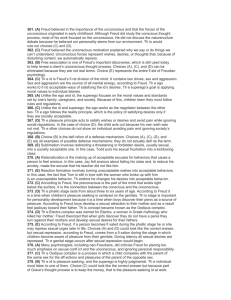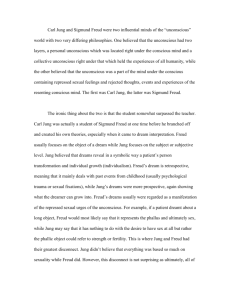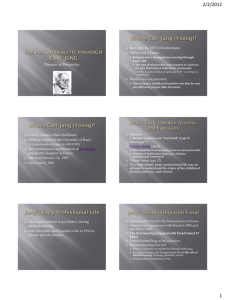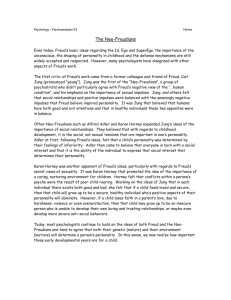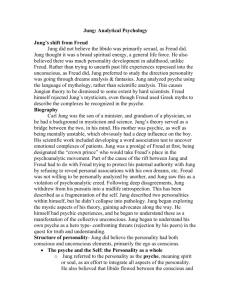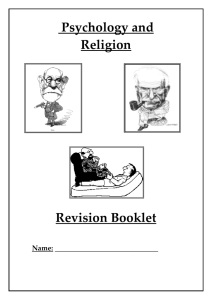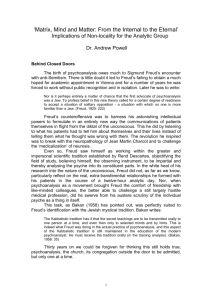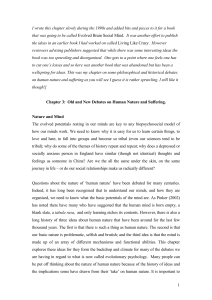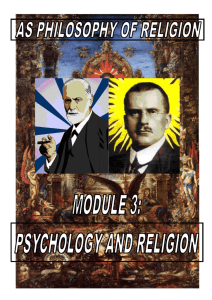Chapter 14 – Theories of Personality
advertisement
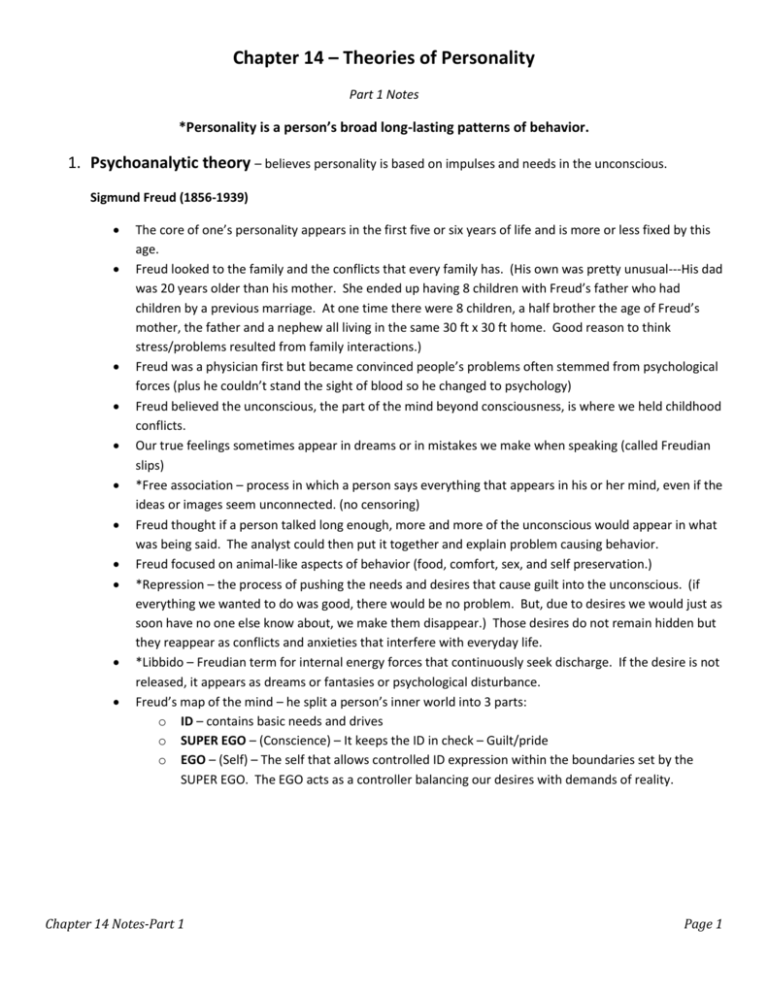
Chapter 14 – Theories of Personality Part 1 Notes *Personality is a person’s broad long-lasting patterns of behavior. 1. Psychoanalytic theory – believes personality is based on impulses and needs in the unconscious. Sigmund Freud (1856-1939) The core of one’s personality appears in the first five or six years of life and is more or less fixed by this age. Freud looked to the family and the conflicts that every family has. (His own was pretty unusual---His dad was 20 years older than his mother. She ended up having 8 children with Freud’s father who had children by a previous marriage. At one time there were 8 children, a half brother the age of Freud’s mother, the father and a nephew all living in the same 30 ft x 30 ft home. Good reason to think stress/problems resulted from family interactions.) Freud was a physician first but became convinced people’s problems often stemmed from psychological forces (plus he couldn’t stand the sight of blood so he changed to psychology) Freud believed the unconscious, the part of the mind beyond consciousness, is where we held childhood conflicts. Our true feelings sometimes appear in dreams or in mistakes we make when speaking (called Freudian slips) *Free association – process in which a person says everything that appears in his or her mind, even if the ideas or images seem unconnected. (no censoring) Freud thought if a person talked long enough, more and more of the unconscious would appear in what was being said. The analyst could then put it together and explain problem causing behavior. Freud focused on animal-like aspects of behavior (food, comfort, sex, and self preservation.) *Repression – the process of pushing the needs and desires that cause guilt into the unconscious. (if everything we wanted to do was good, there would be no problem. But, due to desires we would just as soon have no one else know about, we make them disappear.) Those desires do not remain hidden but they reappear as conflicts and anxieties that interfere with everyday life. *Libbido – Freudian term for internal energy forces that continuously seek discharge. If the desire is not released, it appears as dreams or fantasies or psychological disturbance. Freud’s map of the mind – he split a person’s inner world into 3 parts: o ID – contains basic needs and drives o SUPER EGO – (Conscience) – It keeps the ID in check – Guilt/pride o EGO – (Self) – The self that allows controlled ID expression within the boundaries set by the SUPER EGO. The EGO acts as a controller balancing our desires with demands of reality. Chapter 14 Notes-Part 1 Page 1 Freud believed there were 5 stages of development Stage 1 – Oral Stage: Birth to 1 ½ years – Feeding and weaning are the child’s main issues. Weaning too early or too late causes personality problems according to Freud. Ex of these personality problems: depending too much on others, rejecting others, overeating, starvation, etc. Stage 2 – Anal Stage: 1 ½ to 2 ½ years – Toilet training is child’s major concern in this stage. Toilet training that is too lenient or too harsh will cause psychological problems such as: being stingy, sticking to rigid rules, overly generous, irresponsible, rebellious. Stage 3 – Phallic Stage: 2 ½ to 5 or 6 years – A child experiences romantic interest in the opposite sex parent in this stage and hostility towards the same sex parent. “Oedipus Complex” names for Greek play where character killed his father and married his mother without knowing it at the time. Only way to deal with these romantic, jealous, aggressive feelings is to identify with parent of same sex. Stage 4 – Latency Stage – Age 6 to Preadolescence. Conflicts are hidden or go below the surface. Stage 5 – Genital Stage – Adolescence and older – The individual seeks an appropriate marital partner and earlier conflicts reappear. Even though the way the conflicts are expressed may have changed, their content is left over from the first five years of life. 2. Carl Jung (1875-1961) Friends with Freud in the beginning but later they disagreed and became at odds with each other. Jung believed the unconscious is a well of mystical and religious beliefs that controls our behavior. *archetypes – Jung’s term for inherited universal human concepts (such as the idea of some form of God, great heroes, and concepts of mothers as supportive characters.) Jung thought if certain concepts appeared everywhere throughout history in separate civilizations which had no contact with each other that they must be part of all humans from the beginning of life. Jung thought humans are guided by certain beliefs we inherit rather than being guided by unconscious that seeks pleasure. *Collective unconscious – Jung’s term for the portion of a person that contains ideas or archetypes (as listed before of hero, mother, God, etc) shared by the whole human race. Jung believed as we tried to become the mythical people we are born to aspire to be, we hide our real feelings and our real personalities. The fake personality that we then develop is called a persona* (a “mask” people wear to hide what they really are or feel) Your persona becomes the social mask you wear. Chapter 14 Notes-Part 1 Page 2

